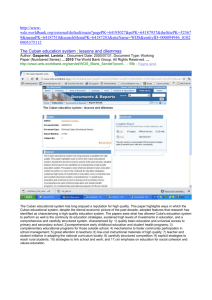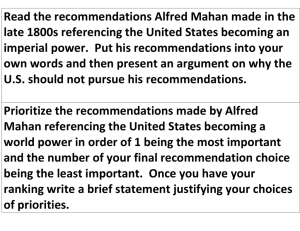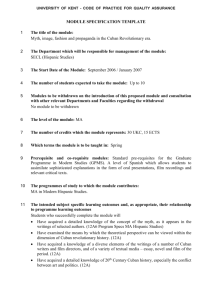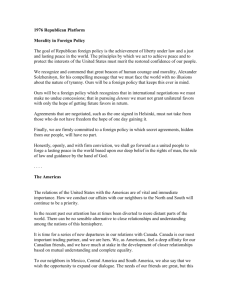View Article - King & Spalding
advertisement
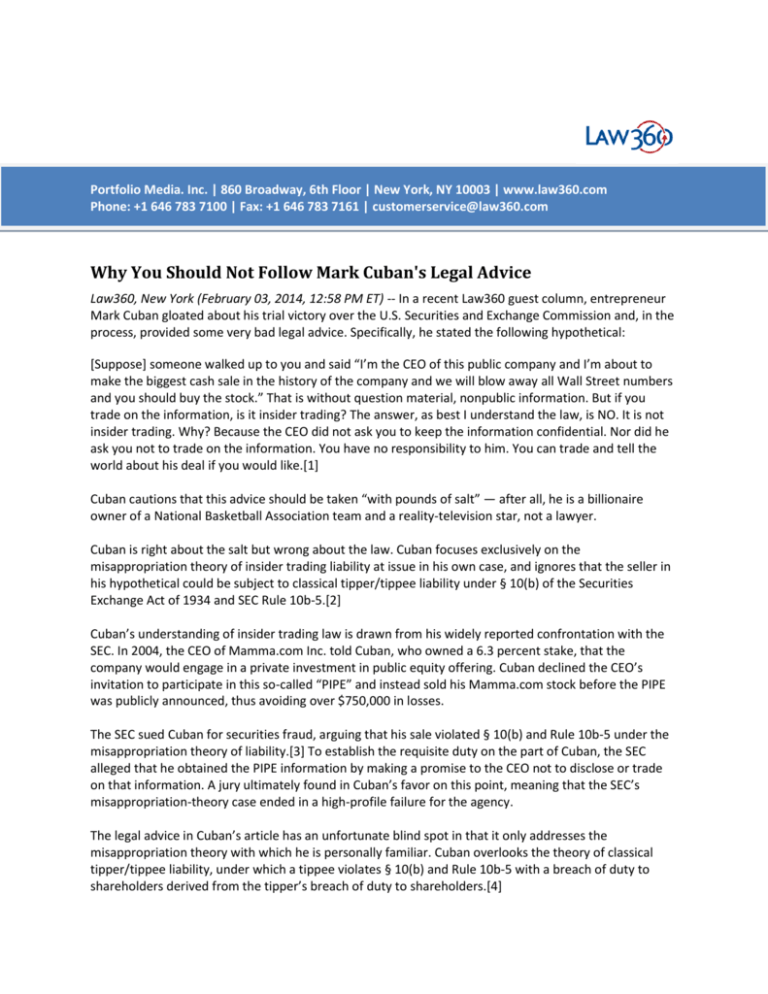
Portfolio Media. Inc. | 860 Broadway, 6th Floor | New York, NY 10003 | www.law360.com Phone: +1 646 783 7100 | Fax: +1 646 783 7161 | customerservice@law360.com Why You Should Not Follow Mark Cuban's Legal Advice Law360, New York (February 03, 2014, 12:58 PM ET) -- In a recent Law360 guest column, entrepreneur Mark Cuban gloated about his trial victory over the U.S. Securities and Exchange Commission and, in the process, provided some very bad legal advice. Specifically, he stated the following hypothetical: [Suppose] someone walked up to you and said “I’m the CEO of this public company and I’m about to make the biggest cash sale in the history of the company and we will blow away all Wall Street numbers and you should buy the stock.” That is without question material, nonpublic information. But if you trade on the information, is it insider trading? The answer, as best I understand the law, is NO. It is not insider trading. Why? Because the CEO did not ask you to keep the information confidential. Nor did he ask you not to trade on the information. You have no responsibility to him. You can trade and tell the world about his deal if you would like.[1] Cuban cautions that this advice should be taken “with pounds of salt” — after all, he is a billionaire owner of a National Basketball Association team and a reality-television star, not a lawyer. Cuban is right about the salt but wrong about the law. Cuban focuses exclusively on the misappropriation theory of insider trading liability at issue in his own case, and ignores that the seller in his hypothetical could be subject to classical tipper/tippee liability under § 10(b) of the Securities Exchange Act of 1934 and SEC Rule 10b-5.[2] Cuban’s understanding of insider trading law is drawn from his widely reported confrontation with the SEC. In 2004, the CEO of Mamma.com Inc. told Cuban, who owned a 6.3 percent stake, that the company would engage in a private investment in public equity offering. Cuban declined the CEO’s invitation to participate in this so-called “PIPE” and instead sold his Mamma.com stock before the PIPE was publicly announced, thus avoiding over $750,000 in losses. The SEC sued Cuban for securities fraud, arguing that his sale violated § 10(b) and Rule 10b-5 under the misappropriation theory of liability.[3] To establish the requisite duty on the part of Cuban, the SEC alleged that he obtained the PIPE information by making a promise to the CEO not to disclose or trade on that information. A jury ultimately found in Cuban’s favor on this point, meaning that the SEC’s misappropriation-theory case ended in a high-profile failure for the agency. The legal advice in Cuban’s article has an unfortunate blind spot in that it only addresses the misappropriation theory with which he is personally familiar. Cuban overlooks the theory of classical tipper/tippee liability, under which a tippee violates § 10(b) and Rule 10b-5 with a breach of duty to shareholders derived from the tipper’s breach of duty to shareholders.[4] The SEC did not pursue a classical tipper/tippee case against Cuban, presumably because it believed that the CEO of Mamma.com had secured a promise from Cuban not to trade on the PIPE information and therefore had not provided a duty-breaching tip.[5] The SEC lost on its misappropriation claim because it failed to convince a jury that Cuban agreed to keep the information confidential and not sell his Momma.com stock. But the SEC would likely win a classical tipper/tippee claim against the seller in Cuban’s hypothetical. Classical tipper/tippee liability depends upon establishing the following five elements: (1) the tipper possessed material nonpublic information; (2) the tipper disclosed this information to the tippee; (3) the tippee traded in possession of this information; (4) the tippee knew or should have known that the tipper violated a relationship of trust by disclosing the information; and (5) the tipper personally benefited by disclosure to the tippee.[6] Cuban concedes the first three elements with his hypothetical, in which a tippee (the man on the street) trades on material nonpublic information (the upcoming cash sale) that he received from a tipper (the CEO) who conveyed the information intending to facilitate a trade (“you should buy the stock”). As for the fourth element, the tippee knows or should know, by virtue of the tipper’s high-ranking position as CEO, that disclosure of the material nonpublic information violated a relationship of trust between the CEO and his shareholders.[7] Liability therefore comes down to proving a personal benefit to the tipper, and courts have described the SEC’s burden as “modest” in this regard.[8] Resolution of the fifth element will likely turn on the unspecified identity of the hypothetical seller. If the seller is just an average Joe and a stranger to the CEO (which is unlikely — why would a CEO provide a tip to a complete stranger?), then a court might find that there was no benefit to the CEO tipper.[9] But if the seller is a person who could confer some reciprocal benefit upon the CEO — a “big shot,” if you will — then the CEO will have gained a personal benefit by passing him a tip, and liability will follow under the classical tipper/tippee theory.[10] Accordingly, Cuban’s bad legal advice is at its worst when applied to Cuban himself: Someone who tips a powerful man like Cuban surely hopes to secure reputational benefits that might eventually result in, say, an infusion of Cuban’s ample capital, a positive mention to his millions of Twitter followers, or courtside seats at a Dallas Mavericks game.[11] Cuban’s legal advice is similarly unsound as to corporate directors and officers, along with their friends and family. An insider who introduces himself to such a person and then urges his newfound friend to trade on material nonpublic information could easily be found to benefit from giving the tip. Given the high costs of defending an SEC investigation, to say nothing of the civil damages and perhaps even criminal punishment that could be imposed, trading on such information is not a risk worth taking. Insider trading is a top priority area for the SEC’s enforcement program — over the last three years the SEC has filed 168 insider trading actions, the most of any three-year period.[12] Although the SEC lost its case against Cuban, it often wins insider trading cases, reporting victories in about half of them.[13] Moreover, the SEC has developed sophisticated software that detects unusual trading prior to the release of corporate news.[14] Mark Cuban spent around $12 million to “win” his case against the SEC.[15] If you cannot afford to shell out that kind of money, then you should not follow Cuban’s legal advice. —By Michael J. Biles and James P. Sullivan, King & Spalding LLP Michael Biles is a partner in King & Spalding’s Securities Litigation Group in Austin, Texas. James Sullivan is an associate in the Securities Litigation Group. The opinions expressed are those of the author(s) and do not necessarily reflect the views of the firm, its clients, or Portfolio Media Inc., or any of its or their respective affiliates. This article is for general information purposes and is not intended to be and should not be taken as legal advice. [1] Mark Cuban, SEC V. Schvacho Has Some Real Comedy, Law360 (Jan. 23, 2014), http://www.law360.com/articles/503191/sec-v-schvacho-has-some-real-comedy. [2] 15 U.S.C. § 78j(b); 17 C.F.R. § 240.10b-5. [3] A trader does not violate the anti-fraud provisions of § 10(b) and Rule 10b-5 by trading on material nonpublic information unless he violates some duty to disclose or abstain in so doing. See Chiarella v. United States, 445 U.S. 222, 234–35 (1980); Dirks v. SEC, 463 U.S. 646, 655–59 (1983); see also SEC v. Tex. Gulf Sulphur Co., 401 F.2d 833, 848 (2d Cir. 1968) (en banc) (discussing disclose-or-abstain rule of In re Cady, Roberts & Co., 40 S.E.C. 907 (1961)). Under the misappropriation theory, the requisite duty can arise between the trader and the source of his information. See United States v. O’Hagan, 521 U.S. 642, 652–53 (1997). To win its case against Cuban, then, the SEC had to prove that he breached some duty to the CEO of Mamma.com by trading on the PIPE information. [4] See Dirks, 463 U.S. at 654–64. [5] There can be no derivative breach of duty by the tippee if there has been no breach of duty by the tipper. Dirks, 463 U.S. at 662. And a tipper commits no breach if he discloses information without intending for someone else to trade on it. See, e.g., id. at 665–67 (holding that tippee was not subject to classical tipper/tippee liability where tippers revealed information to uncover corporate fraud); SEC v. Switzer, 590 F. Supp. 756, 762, 766 (W.D. Okla. 1984) (holding that tippee was not subject to classical tipper/tippee liability where tipper inadvertently revealed information through overheard conversation between tipper and tipper’s wife). [6] See SEC v. Warde, 151 F.3d 42, 47 (2d Cir. 1998) (citing Dirks, 463 U.S. at 654–64). [7] See, e.g., United States v. Hughes, 505 F.3d 578, 594 (6th Cir. 2007) (holding that tippee who is aware that tipper serves on board of directors knows or should know that tipper stands in a position of trust with respect to his company); Warde, 151 F.3d at 48 (same); SEC v. Carroll, 2011 WL 5880875, at *8 (W.D. Ky. Nov. 23, 2011) (holding that tippee has reason to know that tipper employed as vice-president of sales breaches duty by disclosing information acquired in that role). [8] United States v. Jiau, 734 F.3d 147, 153 (2d Cir. 2013) (“The proof required to show personal benefit to the tipper is modest ....”); see also SEC v. Yun, 327 F.3d 1263, 1280 (11th Cir. 2003) (“The showing needed to prove an intent to benefit is not extensive.”). [9] See, e.g., SEC v. Maxwell, 341 F. Supp. 2d 941, 948–49 (S.D. Ohio 2004) (holding that executive received no personal benefit by disclosing information to his barber, “[g]iven the parties’ relative stations in life”). Personal benefit would be clearly established if the CEO and the man on the street were family members, friends, or business partners, but Cuban’s hypothetical seems to exclude this possibility. See, e.g., SEC v. Obus, 693 F.3d 276, 291 (2d Cir. 2012); SEC v. Rocklage, 470 F.3d 1, 7 (1st Cir. 2006); Yun, 327 F.3d at 1280; SEC v. Maio, 51 F.3d 623, 632 (7th Cir. 1995). [10] See, e.g., SEC v. Sargent, 229 F.3d 68, 72, 77 (1st Cir. 2000) (holding that tipper received personal benefit by disclosing information to a well-connected dentist with whom tipper wished “to maintain a useful networking contact”). The Fifth Circuit recognized this point in Cuban’s own case. See SEC v. Cuban, 620 F.3d 551, 557 & n.38 (5th Cir. 2010) (“Under Cuban’s reading, he was allowed to trade on the information but prohibited from telling others — in effect providing him an exclusive license to trade on the material nonpublic information. ... Such an arrangement would raise serious tipper/tippee liability concerns were it explicit. If the CEO knowingly gave Cuban material nonpublic information and arranged so he could trade on it, it would not be difficult for a court to infer that the CEO must have done so for some personal benefit — e.g., goodwill from a wealthy investor and large minority stakeholder.”). [11] See Dirks, 463 U.S. at 663–64 (“[C]ourts [must] focus on objective criteria, i.e., whether the insider receives a direct or indirect personal benefit from the disclosure, such as a pecuniary gain or a reputational benefit that will translate into future earnings. ... [T]here may be a relationship between the insider and the recipient that suggests a quid pro quo from the latter, or an intention to benefit the particular recipient. The elements of fiduciary duty and exploitation of nonpublic information also exist when an insider makes a gift of confidential information to a trading relative or friend. The tip and trade resemble trading by the insider followed by a gift of the profits to the recipient.” (citations omitted)). [12] SEC Enforcement Actions — Insider Trading Cases (last visited Jan. 30, 2014), www.sec.gov/ spotlight/insidertrading/cases.shtml. [13] See Rob Tricchinelli, Insider Trading Gets More Sophisticated, So Regulators Must Follow Suit, Panel Says, Bloomberg Law (Jan. 15, 2014), http://about.bloomberglaw.com/law-reports/insider-trading-getsmore-sophisticated-so-regulators-must-follow-suit-panel-says/ (reporting estimated success rate from Daniel M. Hawke, Chief of the SEC Enforcement Division’s Market Abuse Unit). [14] See id. [15] See, e.g., Dina ElBoghdady, Billionaire Mark Cuban Takes on the SEC, Wash. Post (Nov. 20, 2013), http://www.washingtonpost.com/business/economy/billionaire-mark-cuban-takes-on-the-sec/ 2013/11/20/2b67134a-4a7c-11e3-be6b-d3d28122e6d4_story.html. All Content © 2003-2014, Portfolio Media, Inc.
